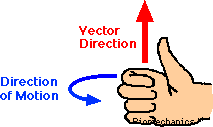Circular Motion
Introduction
The circular motion is a special case of Linear or Translatory motion in which particle revolves along the circumference of a circle.
Examples
- Motion of earth and other planets around the sun.
- Motion of tip of the minute hand, hour & secondhand of the clock
- Motion of the roller coaster looping the loop.
Angular Displacement
Definition- "The angle described by radius vector in a given time at centre of the circle"
Formula
θ(in radian)=s÷r
where s is length P1 to P, r is radius, θ is Angular displacement
Right-Hand Rule
"Imagine the axis of rotation to be held in the right hand with the fingers curled around it and the tumb is outstretched. If the curled finger the give the direction of motion of a particle performing the circular motion, then the direction of outstretched thumb gives the direction of the angular displacement vector."
Angular Velocity & Angular Acceleration
Angular Velocity(ω)
A particle performing circular motion is defined as the time rate of change of limiting angular displacement. It is a Vector Quantity.
S.I. unit - rad/s Dimensions - [L^0M^0T^-1]
Angular Acceleration(α)
Average angular acceleration is defined as the time of change of angular velocity
Formula
α = Change in angular velocity/ time
α = 𝛅ω/𝛅t
S.I. unit - rad/s^2 Dimension [L^0M^0T^-2]
Relation Between Linear Velocity & Angular Velocity
To see Let's Learn Circular Motion Part 2 Please Click
Lets learn circular motion Part 2
Lets learn circular motion Part 2








No comments:
Post a Comment